《英语教学法教程》课件—04
英语教学法教程王蔷
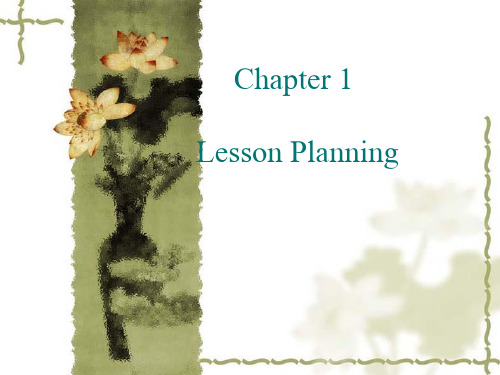
1) understanding the aims and language contents of the lesson;
2) distinguishing the various stages of a lesson;
Knowing about
the course the institution(school); the learners the syllabus
Micro planning is usually for a special lesson./ lesson
plan
Components of a lesson plan
Chapter 1 Lesson Planning
❖ Why is lesson planning necessary? ❖ Principles for good lesson planning ❖ Macro planning vs. micro planning ❖ Components of a lesson plan ❖ Sample lesson plans
Variety:
different types of activities and a wide selection of materials.
Flexibility: different methods and techniques
the contents and tasks should Learnability: be within the learning capability
7) After class reflection
《王蔷英语教法》PPT课件.ppt

(3)导学课
• 共四次导学课 • 语音教学系统地址: http://218.19.140.194/main/index.jhtml • 可以通过网院主页 /index.html 左下方的“华师在线语音教学系统”进 入。
(4) BBS ( “交流园地”或“课程交流” )
内容
2、本课程的学习内容
Language and (language) Learning
Communicative Principles and Activities(and Task-Based Language Teaching) The National English Curriculum Lesson Planning Classroom Management Teaching Pronunciation Teaching Grammar Teaching Vocabulary
网络课件中的内容
• 课件中的主要内容:
– 精讲课:视频录像 + PPT – 期末考试模拟试题(附答案)两套 – 课外阅读材料(参考资料)。
关于网络课件中“课外阅读”的 材料
• 网络课件中“课外阅读”的材料内容不 会作为考试题目的知识点,但: • 建议同学们,尤其是已经在当英语教师 的同学们,要在适当的时候阅读,这对 英语教学实践和教研将有裨益。
The structural view
Sentences phrases Words Morphemes (the smallest meaningful unit) Phonemes (the smallest unit)
Top
The structural view
Syntactic system (phrases & sentences) …
英语教学法Unit4
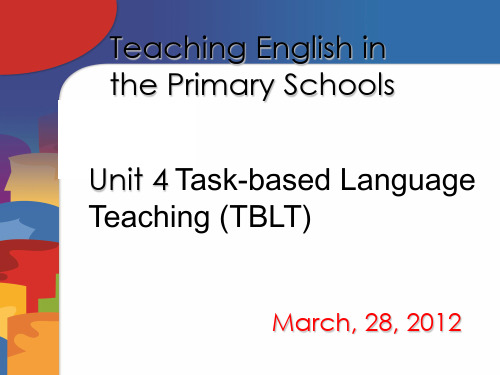
An exercise
Going shopping Look at Mary’s shopping list. Then look at the list of items in Abdullah’s store.
Mary’s shopping list 1. oranges 2. eggs 3. flour 4. powdered milk 5. biscuits 6. jam Abdullah’s store 1. bread 2. salt 3. apples 4. Coca Cola 5. tins of fish 6. four 7. chocolate 8. sugar 9. curry powder 10. biscuits 11. powdered milk 12. dried beans
——Skehan(1998) ( )
PURPOSE
CONTEXT PROCESS
OUTCOME
TASK
MEANING
AUTHENICITY
COMMUNICATIVE
Difference between exercises, exercise-tasks, and tasks
Exercises, exercise-tasks, and tasks
—Rod Ellis
1. Meaning is primary. (意义是首要的)。 意义是首要的) 2.There is a communicative problem to be solved. (有某 个交际问题需要解决。 个交际问题需要解决。) 3.There is some sort of relationship to comparable realworld activities.(任务具有在现实生活中有发生的可能 ( 性。) 4.Task completion has some priority.(完成任务是首要 ( 考虑。) 考虑。 5.The assessment of the task is in terms of outcomes. 根据任务的结果评估任务的执行情况。 (根据任务的结果评估任务的执行情况。)
王蔷教学法讲义
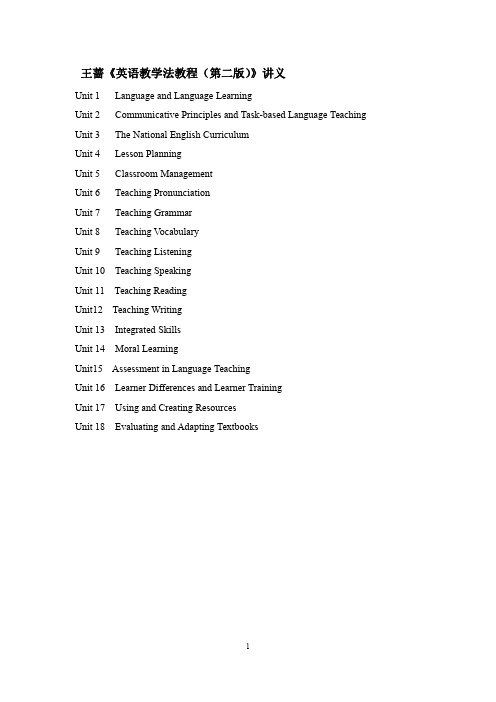
王蔷《英语教学法教程(第二版)》讲义Unit1Language and Language LearningUnit2Communicative Principles and Task-based Language Teaching Unit3The National English CurriculumUnit4Lesson PlanningUnit5Classroom ManagementUnit6Teaching PronunciationUnit7Teaching GrammarUnit8Teaching VocabularyUnit9Teaching ListeningUnit10Teaching SpeakingUnit11Teaching ReadingUnit12Teaching WritingUnit13Integrated SkillsUnit14Moral LearningUnit15Assessment in Language TeachingUnit16Learner Differences and Learner TrainingUnit17Using and Creating ResourcesUnit18Evaluating and Adapting Textbooks语言和语言学习【考情分析】本章主要讨论语言观和语言学习观、优秀教师的基本素养以及如何成为一名优秀的英语教师。
主要考点:结构主义、功能主义和交互语言理论;行为主义、认知主义、建构主义和社会建构主义学习理论;一个好的语言老师必备的素养;教师专业技能发展等。
【知识框架】Unit1 Language and Language Learning Views on languageViews in generalA good language teacherFunctional viewBehaviourist theoryCognitive theoryConstructivist theorySocio-constructivist theoryInteractional viewHow can one becomea good language teacher?An overview of the bookethic devotionprofessional qualitiespersonal stylesStage1Language trainingStage2Learning,practiceand reflectionGoal语言和语言学习1.1How do we learn languages?We learn language at different agesPeople have different experiencesPeople learn languages for different reasonsPeople learn languages in different waysPeople have different understandingsPeople have different capabilities in language learningLearning can be affected by the way how language is taughtLearning is affected by the degree of success one is expect to achieve.Thus the challenge confronting language teaching is how teaching methodology can ensure successful learning by all the learners who have more differences than the commonality.1.2Views on languageIn the past century,language teaching and learning practice has been influenced by three different views of language,namely,the structural view,the functional view and the interactional view.(1)The structural view of language结构主义语言观The structural view of language sees language as a linguistic system made up of various subsystem(Larsen-Freeman&Long,1991):the sound system(phonology音系学);the discrete units of meanings produced by sound combinations(morphology形态学/词汇学),and the system of combining units of meaning for communication (syntax句法学).Each language has a finite number of such structural items.结构主义语言观:结构主义语言观将语言看作由许多子系统组成的语言学系统(Larsen-Freeman&Long,1991):语音系统(音系学);产生于语音集合的意义的离散单位(形态学),以及交际意义的集合单元系统(句法学)。
(完整版)《英语教学法》Unit_4_Lesson_Planning
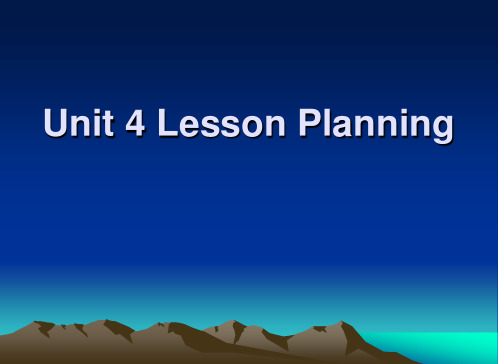
• Language teachers benefit from lesson planning in :
lesson planning?p.52-53 • What types of lessons do you know?
• Lesson planning means making decisions in advance about what techniques, activities and materials will be used in the class.
• ● Size of classroom: restricts some types of
activities
• ● Teaching aids: sufficient or not • ● Time of day: influences the types of
activities used (p.m. or a.m.)
• Procedures are the detailed steps in each teaching stage.
What teaching model is the easiest procedure to teach a new
structure-based lesson?
• PPP model, which includes presentation, practice and production.
英语教学法(教学PPT)
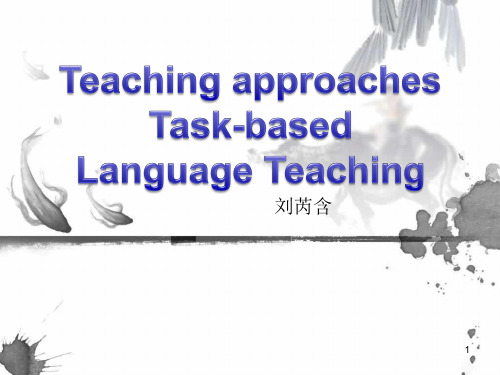
• S1:Which do you prefer ,tea or coffee ?
• S2:I prefer coffee./I prefer tea./I like them all./I don't like either .
• The activity is not merely reacting to the questions .But it is not a really task .It depends on the teacher's choices.
• Input:Questionnaire on sleeping habits • Activity:1)Reading questionnaire 2)Asking
and answering questions about sleeping habits • Teacher role:monitor and facilitator;to specify what is regarded as successful completion of the task • Learner role :conversational partner
15
An example in TBLT
• 语言结构:This is ... • 语言功能:指定与介绍(indentification
and introduction) • 1.学生模拟产品讲解员(或商店售货员)向
顾客介绍产品(或商品)简单描述用途:
• This is a thermometer.It is used to measure temperetures.
• 适用于我国英语教学现状的“任务型”教学法
任务是可称之为“中间型”教学任务
英语教学法教程 课件
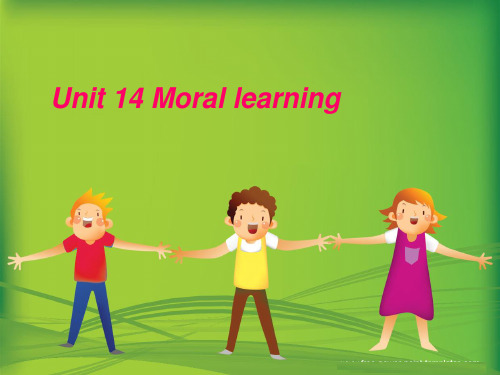
There is a Chinese saying that'Teachers are engineers of the soul'. This suggests that we are not just responsible for students' moral development. The word 'education' comes from the Latin verb educare, which means to'bring out'. In other words, teachers should try to bring out the full potential of their students as human beings, so they can live meaningful, fulfilling and responsible lives. At first glance, English language teaching may not seem an important area for moral learning. It is a foreign language and is sometimes associated with social values that are not shared by Chinese people. On the other hand, English lessons can provide excellent opportunities for a focus on moral values
Didactic model: students are explicitly and regelarly taught moral behaviour, as determined by the teacher.
《小学英语教学法》课件

Collect feedback from students on their learning experience, including the effectiveness of the course in enhancing their English skills and knowledge
Encouraging active learning
promoting student participation in class ions, role playing, and other interactive activities
Assessing student progress
Evaluate one's own delivery of instructions, including language clarity, ability to engage students, and utilization of effective teaching techniques
Detailed description
Summary
Learning language by completing practical tasks, emphasizing the practical application of language and problem-solving abilities.
Summary
Teaching language by simulating real-life scenarios to help students understand and apply language.
Detailed description
- 1、下载文档前请自行甄别文档内容的完整性,平台不提供额外的编辑、内容补充、找答案等附加服务。
- 2、"仅部分预览"的文档,不可在线预览部分如存在完整性等问题,可反馈申请退款(可完整预览的文档不适用该条件!)。
- 3、如文档侵犯您的权益,请联系客服反馈,我们会尽快为您处理(人工客服工作时间:9:00-18:30)。
A.Macro Planning
• In a sense, macro planning is not writing lesson plans for specific lesson but rather familiarizing with the context in which language teaching is taking place. Macro planning involves the following:
1) Knowing about the course:
The teacher should get to know which language areas and language skills should be taught or practised in a course, what materials and teaching aids are available, and what methods and techniques can be used.
2) Knowing about the institution:
• The teacher should get to know the institution’s arrangements regarding time, length, frequency of lessons, physical conditions of classrooms, and exam requirements.
5. Aim
Aim means the realistic goals for the lesson. In other words, the teacher needs to have a clear idea of what he\she would like to achieve for the lesson or what outcomes are expected from the lesson.
3.Learnability:
The contents and tasks planned for the lesson should be within the learning capability of the students. Of course, things should not be too easy either. Doing things that are beyond or below the students’coping ability will diminish their motivation.
- to get to know the components of a lesson plan
- to know the principles for good lesson plann Lesson Planning
1.Variety:
Planning a number of different types of activities and where possible introducing students to a wide selection of materials so that learning is always interesting, motivating and never monotonous for the students.
2.Flexibility:
Planning to use a number of different methods and techniques rather than being a slave to one methodology. This will make teaching and learning more effective and more efficient.
Unit 4 Lesson Planning
Aims of the Unit
- to understand why lesson planning is necessary
- learn the difference between macro planning and micro planning
4.Linkage:
The stages and the steps within each stage are planned in such a way that they are somehow linked with one another. Language learning needs recycling and reinforcement.
II.Macro Planning Vs. Micro Planning
Ideally, lesson planning should be done ay two levels: macro planning and micro planning. The former is planning over time, for instance, the planning for a month,a term, or the whole course. The latter is planning for a specific lesson, which usually lasts 40 or 50 minutes. Of course, there is no clear cut difference between these two types of planning. Micro planning should be based on macro planning, and macro planning is apt to be modified as lessons go on.
